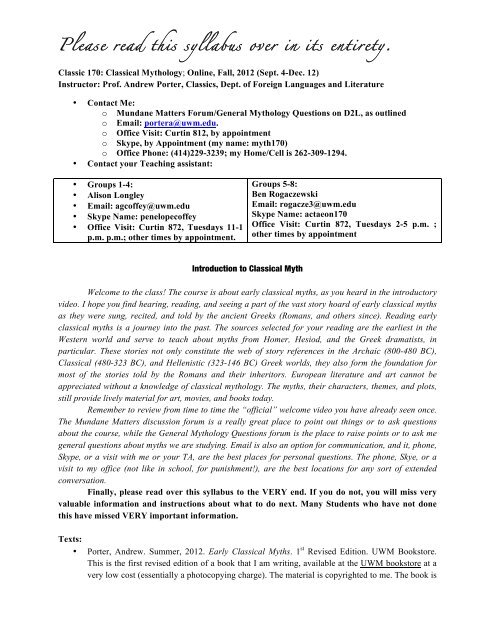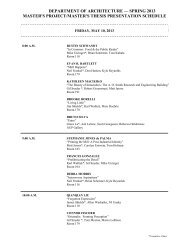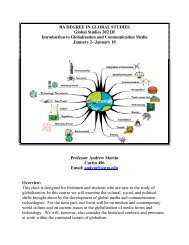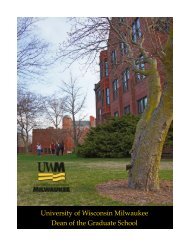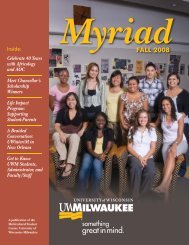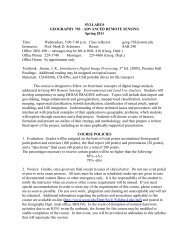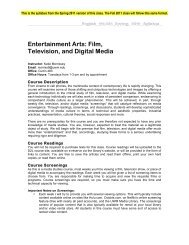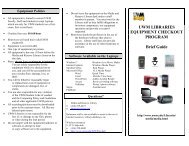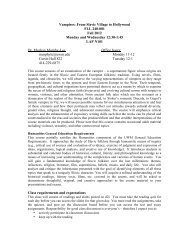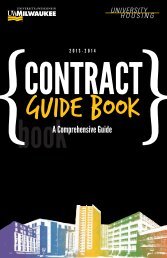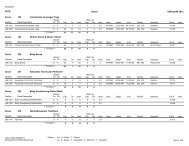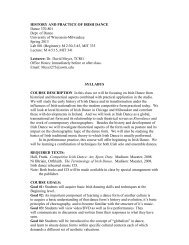Classic 170 syllabus, Sept.1, 2012 - UW-Milwaukee
Classic 170 syllabus, Sept.1, 2012 - UW-Milwaukee
Classic 170 syllabus, Sept.1, 2012 - UW-Milwaukee
You also want an ePaper? Increase the reach of your titles
YUMPU automatically turns print PDFs into web optimized ePapers that Google loves.
Please read this <strong>syllabus</strong> over in its entirety.<strong>Classic</strong> <strong>170</strong>: <strong>Classic</strong>al Mythology; Online, Fall, <strong>2012</strong> (Sept. 4-Dec. 12)Instructor: Prof. Andrew Porter, <strong>Classic</strong>s, Dept. of Foreign Languages and Literature• Contact Me:o Mundane Matters Forum/General Mythology Questions on D2L, as outlinedo Email: portera@uwm.edu.o Office Visit: Curtin 812, by appointmento Skype, by Appointment (my name: myth<strong>170</strong>)o Office Phone: (414)229-3239; my Home/Cell is 262-309-1294.• Contact your Teaching assistant:• Groups 1-4:• Alison Longley• Email: agcoffey@uwm.edu• Skype Name: penelopecoffey• Office Visit: Curtin 872, Tuesdays 11-1p.m. p.m.; other times by appointment.Groups 5-8:Ben RogaczewskiEmail: rogacze3@uwm.eduSkype Name: actaeon<strong>170</strong>Office Visit: Curtin 872, Tuesdays 2-5 p.m. ;other times by appointmentIntroduction to <strong>Classic</strong>al MythWelcome to the class! The course is about early classical myths, as you heard in the introductoryvideo. I hope you find hearing, reading, and seeing a part of the vast story hoard of early classical mythsas they were sung, recited, and told by the ancient Greeks (Romans, and others since). Reading earlyclassical myths is a journey into the past. The sources selected for your reading are the earliest in theWestern world and serve to teach about myths from Homer, Hesiod, and the Greek dramatists, inparticular. These stories not only constitute the web of story references in the Archaic (800-480 BC),<strong>Classic</strong>al (480-323 BC), and Hellenistic (323-146 BC) Greek worlds, they also form the foundation formost of the stories told by the Romans and their inheritors. European literature and art cannot beappreciated without a knowledge of classical mythology. The myths, their characters, themes, and plots,still provide lively material for art, movies, and books today.Remember to review from time to time the “official” welcome video you have already seen once.The Mundane Matters discussion forum is a really great place to point out things or to ask questionsabout the course, while the General Mythology Questions forum is the place to raise points or to ask megeneral questions about myths we are studying. Email is also an option for communication, and it, phone,Skype, or a visit with me or your TA, are the best places for personal questions. The phone, Skye, or avisit to my office (not like in school, for punishment!), are the best locations for any sort of extendedconversation.Finally, please read over this <strong>syllabus</strong> to the VERY end. If you do not, you will miss veryvaluable information and instructions about what to do next. Many Students who have not donethis have missed VERY important information.Texts:• Porter, Andrew. Summer, <strong>2012</strong>. Early <strong>Classic</strong>al Myths. 1 st Revised Edition. <strong>UW</strong>M Bookstore.This is the first revised edition of a book that I am writing, available at the <strong>UW</strong>M bookstore at avery low cost (essentially a photocopying charge). The material is copyrighted to me. The book is
2 also available in e-form from the bookstore. See the LINKS page of D2L. Please do not attemptto use any earlier edition, since some elements have been changed.• Mulroy, David, Trans. 2011. Oedipus Rex, by Sophocles. Madison: University of WisconsinPress, available at Panther Books on Downer.• You will not want to wait to purchase/order these texts. There is a link to each bookstore on theLinks page of our website for ordering information. Look under “COURSE TEXTS”.• The first two chapters of Early <strong>Classic</strong>al Myths are available to you on our course website, toallow for some shipping time or late registration, although the e-book is available right away.Course StructureThere are 7 units for the course, with specific opening and closing dates. A unit is usually composed of:1.) 1-2 brief chapter readings/audios from Early <strong>Classic</strong>al Myths (ECM)2.) 1-2 text/audios of an ancient work (hymn, drama, epic selection) or videos of iconography/moviesegments. All videos have captions for those who are visual learners and for the hearing impaired (someare closed captions, so require that you turn them on by clicking on the CC on the lower right of yourvideo player). Remember, you can stop the movie to think about it, before moving on!• Each of the assignments in 1.) and 2.) will be tested by a short quiz, usually of ten questions.3.) An e-assignments/discussion posting, in units 2, 3, and 4.4.) There will also be a paper written in three stages: as a “paper idea,” then a “rough draft,” andlastly the “final paper”.5.) There will be two tests (midterm and final). The second test constitutes the final.The course is not an independent study course, so it is the intention that you be involved on a regularbasis in the course and in the discussion fora, with your classmates. It is good however, to get ahead,rather than behind in your work. Why not begin each unit as soon as it opens? The paper idea, roughdraft, and final paper can be completed as soon as you wish, although it is strongly encouraged thatyou wait until you complete the e-assignment from Unit 3, how to conduct research in the humanities,before completing your paper.Grade:1. Unit Quizzes: 40%Quizzes are taken for each chapter of ECM, and for all other readings/audios/videos.Expect multiple choice, T/F questions, fill-in-the-blanks, match, and ordering questions. Thequestions are meant to vary in difficulty and complexity. All quizzes have two attempts. PLEASEWAIT AT LEAST ONE HOUR TO WRITE THE QUIZ A SECOND TIME AND UNTIL YOUHAVE REVIEWED THE MATERIAL AGAIN. The second attempt was added to make up forsudden computer problems, accidental submission of quizzes, etc. Wrongly answered questionswill only be available for you to see a couple of days after a unit closes. (In cases where you feelyou have been incorrectly graded, please email me after the quiz closes for the whole class, sothat you can first take time to review the book chapter, text, or video, the question itself, and youranswer, carefully.)Your own notes taken from the readings, not the quizzes you write, are to be the sourceof your review for exams. (FYI, This course is not set up like the game “Trivial Pursuit” :),
3 where, after playing a few times, you can basically memorize the answers. I want you to think.)Note: Out of state/country students, all D2L times are based upon Chicago time.2. E-Assignments (3): 12%In three units (units 2, 3, and 4) there will be a short, but significant e-assignment with amarking rubric to guide your postings to the class. These assignments will have you doing anumber of things, including giving your views on an ancient drama, writing a précis, critiquingyour peers’ posts, and learning how to conduct proper research in the humanities. Discussionposts must be completed within the time the unit is open. These assignments will have youconsider myths, but also begin a post that will assist you as you think about your paper topic.Note: Grades for a Disc. forum will not be posted before the forum closes. Your grade will appearwithin six days.3. Paper Idea (3%), Rough Draft (4%) and Final Paper (17%): 24%The Paper Idea is due in the D2L Dropbox no later than Nov. 1, the Rough Draft, nolater than Nov. 20, and the Final Paper, no later than Dec. 11. Papers will be accepted until Dec.12, but at reduced credit- a loss of 3pts (out of 17).A mark for your Paper Idea and feedback will take place within 3 days of receipt of yourPaper Idea. If you submit your idea early, then send your TA an email saying that you have doneso. (S)he will mark and annotate your paper idea within 3 days of receiving your email. Thesooner you submit your idea, the sooner you will receive feedback.A mark and feedback on your Rough Draft will be given to you within 6 days of thereceipt of your Rough Draft. If you submit a rough early, then send your TA an email saying thatyou have done so. Paper Ideas, Rough Draft, and Final Paper Requirements are available undercourse Resources on the course Content page, along with actual examples of good and badpapers.4. Tests (each of equal value): 24%The two Tests (each having the same format) will be based only upon ECM. Each testwill also be in the same format as the quizzes, except that each will only have 1 attempt. The firsttest (the “midterm”) will cover chapter 1-6, the second test (the “final”), chapters 7-11. Themidterm may be completed as soon as the work for units 1-3 has been finished. The final exam,although requiring knowledge gained earlier on in the course, is not cumulative and can becompleted any time after the work of Unit 7 has been completed, as early as Dec. .Course Schedule: AssignmentsAssignments are divided up into seven units. Each unit begins with a checklist which should beread and followed. Please complete all quizzes in their numbered order unless given the option to dootherwise in the unit checklist, although it is fine to read and view anything open at any time. The courseis meant to be a progression. Also note, you may start your class Paper Idea at any time. You may want toread over the paper idea and paper requirements early, but also look through all of ECM, at any time, tothink about or get inspired with ideas. You may certainly email, Skype, or visit with me to check an ideaout informally before you submit it.
5 Other Policies: For policies governing participation by students with disabilities, accommodation forreligious observances, academic misconduct, complaint procedures, grade appeal procedures, sexualharassment, incompletes, and financial obligation, please see the <strong>Classic</strong>s bulletin board outside theoffices of the Department of Foreign Languages and Linguistics, eighth floor, Curtin Hall, or the fullexplanation maintained by the Secretary of <strong>UW</strong>M at http://www.uwm.edu/Dept/SecU/SyllabusLinks.pdfCourse Goals: By taking and completing this course you may expect:1. To acquire a better ability in group discussion, the presentation of your ideas, and academic writing,including the structured presentation of your analysis of information and ideas. Assessment: DiscussionFora, Paper2. To consider classical myths through the “critical use of sources, and evaluation of the evidence” 1 frommythologies presented in the course, and exercise judgment and display logical analysis in your interactionwith the central cultural heritage of the classical world. Assessment: Quizzes, Tests, Discussion Fora, Paper3. To become familiar with “substantial and coherent bodies of historical, cultural”, and “literary” knowledgeform ancient sources, as a means of increasing your “understanding of the complexities and varieties ofhuman events” in the ancient world, and by thoughtful comparison, to the modern world. Specifically wewill consider together, after initial myths of the origins and ordering of the gods and world, the myths of theOlympian gods and of mortal heroes and heroines, their personalities, biographies, interactions, andescapades. Assessment: Quizzes, Tests, Discussion Fora, Paper4. To “Enhance and extend” your response to myths from the ancient world by “thoughtful and systematicanalysis” and “and appreciation of” the distinctive culture and tradition of the Greeks and Romans, whoprovide for us the earliest mythologies of Western Civilization. It is hoped that you will see mythology,like the ancients did, as a world of interesting stories, but also, as “stories that exemplify themes, dilemmas,and human characteristics still very much a part of our present day world”, 2 and “of universal concern”.Assessment: Discussion Forum, PaperWhy not consider <strong>Classic</strong>s as a major, minor, or career? Speak with Prof. David Mulroy(dmulroy@uwm.edu), Curtin Hall 803, to find out about all the possible ways you can study ancientGreek and Roman society in more detail. The study of classics can include a major in <strong>Classic</strong>s or<strong>Classic</strong>al Civilization, and a major, minor, or language requirement in Greek or Latin. The departmentalso participates in the Certificate Program in Ancient Mediterranean Studies (CAMS), designed toencourage students to pursue a serious interest in the ancient Mediterranean world in a structured way. Avariety of disciplines are concerned with reconstructing various aspects of ancient civilizations, includinglinguistics, history, archaeology, art history, anthropology, philosophy, and literary studies. The course inwhich you are now enrolled, <strong>Classic</strong>s <strong>170</strong>, counts as credit toward the certificate. For more informationon the CAMS program, be sure to check our website: http://www.uwm.edu/Dept/CAMS/index.html Ifyou have any questions, or would like to sign up as a CAMS student right away, please contact theCAMS Program Coordinator: Prof. Elisabetta Cova, Asst. Professor of <strong>Classic</strong>s Curtin 814covae@uwm.edu.Religious Studies If you are thinking about a major or a double major in Religious Studies, pleasecontact Dr. Judith Beall , Interim Director of Religious Studies, at jbeall@uwm.edu1 Unless otherwise indicated, all Excerpts in this <strong>syllabus</strong>’s course goals are from section V.5.b.2a., p.11, of “TheUniversity of Wisconsin-<strong>Milwaukee</strong> Academic Program and Curriculum Committee GENERAL EDUCATIONREQUIREMENTS POLICIES AND PROCEDURES”, accessed Jan. 2011, athttp://www4.uwm.edu/acad_aff/academic /ger.pdf.2 Excerpt from p. 8 of Porter, Early <strong>Classic</strong>al Myths (the written text for the course).
6 Doing Well in Myth <strong>170</strong>:To do well in this course, you need to spend approximately ten hours a week working on the course,although some people spend more and others less, depending upon background, abilities, etc. Individuallearning styles and needs will determine how the ten hours will best be spent, but a rough guide may be tospend three to four hours a week on ECM readings and preparation for testing, four to five hours a weekon ancient texts readings and audios or videos and preparation for testing, and two hours a week on the e-assignment or your paper project. The paper idea, etc., if begun early, will allow for communicationahead of time with your TA for any questions that arise. In weeks where there are no e-assignments, thistime should be spent on work on your paper idea, rought draft, and then final paper. Remember also, inweeks where a particular assignment requires less time, to revisit the course resources and links meant toassist you in being successful in your work for the class.PLEASE READ CAREFULLY: Now that you have finished reading this <strong>syllabus</strong> over carefully,next:READ 1. D2L Help, 2. Frequently Asked Questions, 3. How to Prepare for Quizzes, 4. PaperRequirements, 5. Variations on Greek and Latin Names, 6. and also quickly read over the other CourseResources found under course Contents; then, WRITE the short practice quiz, found under Quizzes (forpractice, not points. Unlike a normal quiz, you do not need to study for it. It simply reviews things aboutthe course you have read. You will have 15, rather than 10 questions). When you have done thesethings, you can begin Unit 1 with confidence!keep this <strong>syllabus</strong> handy, and refer to it often!!


